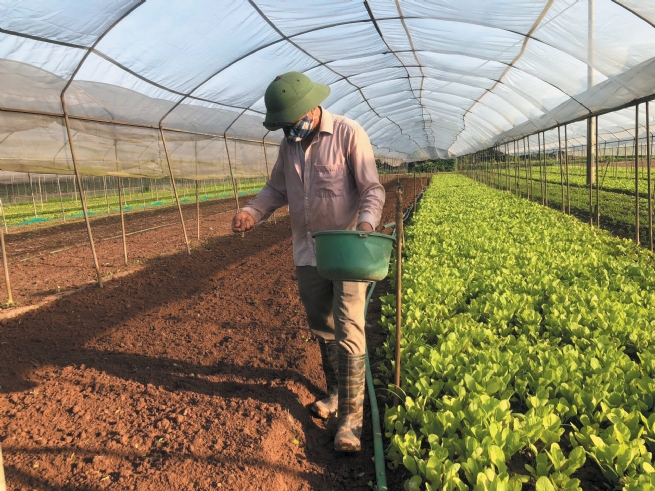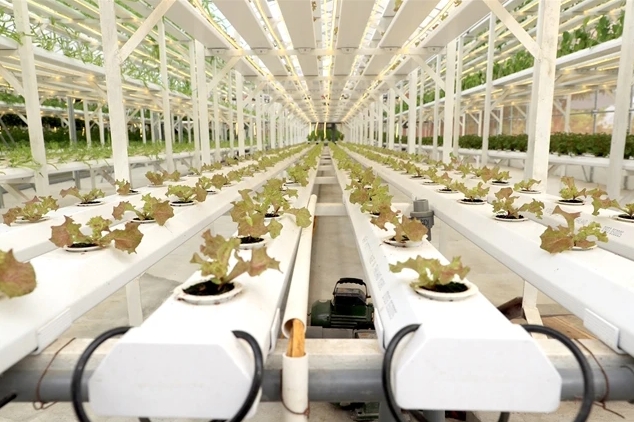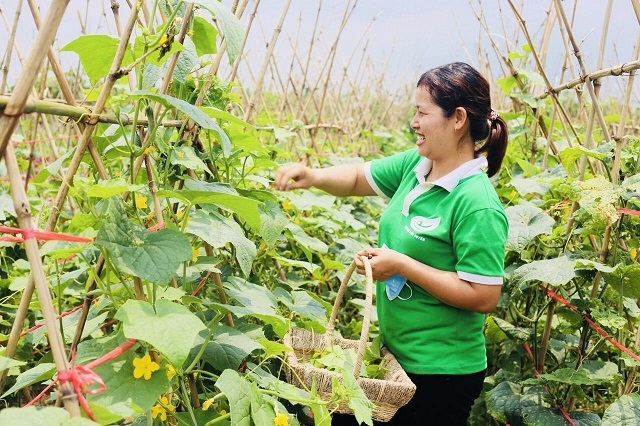9:42:37 AM | 12/8/2024
Hanoi has identified agricultural sector restructuring as a key foundation, focusing on transforming each field to develop green, smart and sustainable agriculture.

Hanoi's agriculture restructuring has boosted the rural economy, raised incomes, and improved living standards
Restructuring the agricultural sector is an important component of Program 04-CTr/TU by the Hanoi Party Committee, which aims to effectively implement the National Target Program for New Rural Development. This program focuses on agricultural restructuring, rural economic development, and improving the material and spiritual lives of farmers from 2021 to 2025.
The One Commune One Product (OCOP) program has positively impacted rural economic development by unlocking land potential, product advantages, and cultural values. It integrates agriculture with services and tourism, fostering creativity among individuals, households, and cooperatives. The program requires strict technical standards, ensuring high-quality, well-designed and safe products that meet market demand and go beyond traditional markets.
Program 04-CTr/TU of the Hanoi Party Committee sets goals for restructuring the agricultural sector and developing the rural economy, including annual growth of 2.5% to 3% in agriculture, forestry, and fishery production. It aims for over 70% of agricultural products to be high-tech, evaluates and classifies more than 2,000 OCOP products, and establishes at least one center for creative design, promotion, and sales of OCOP products in each district. The program also targets recognition of more than 50 craft villages and traditional occupations, with over 80% of cooperatives operating effectively.

According to Director of Hanoi Department of Agriculture and Rural Development Nguyen Xuan Dai, to achieve these goals, the department and localities have implemented many solutions, with significant progress made. For example, the annual growth rate of agricultural, forestry and fishery production has been maintained at 2.5% to 3% over the past three years. High-tech agricultural models and agricultural service chains have flourished, and ecological agriculture has strengthened. Between 2021 and June 2024, Hanoi evaluated 1,657 OCOP products, needing 343 more to meet the 2,000-product target. In 2024, 510 products are registered for evaluation, putting Hanoi on track to exceed the target by the end of the year. Agricultural restructuring has also contributed to shifting production structures, boosting the rural economy, raising incomes, and improving living standards. In 2023, rural per capita income reached VND66.01 million, expected to rise to VND75 million in 2024, with many localities eliminating poverty.
The production of OCOP products has shifted the mindset of producers and cooperatives from small-scale spontaneous methods to large-scale market-oriented production with planned, closed value chains. This approach ensures stable, quality raw material supply. Currently, Hanoi has developed 159 value chains, 93 of which are based on cultivated products. Through these models, farmers are trained in production processes, management techniques and new scientific advances, improving efficiency, boosting incomes, and driving agricultural and rural economic growth, all while contributing to sustainable poverty reduction.
Each OCOP product serves as an "ambassador," sharing the unique stories of regions such as My Duc lotus silk, Bat Trang pottery, and Chuon Ngo mother-of-pearl inlay. These products help promote the image of localities, attracting visitors and tourists to explore and learn more.

Despite efforts, agricultural sector restructuring has not fully met development needs. Scientific and technological advancements have not yet become key drivers for agricultural and rural development, and their application in production remains limited. For example, while the target was to recognize 50 craft villages, only 24 were recognized by the end of 2023. Similarly, the goal of having 80% of cooperatives operate effectively only reached 65%, and the target of over 70% of agricultural products using high technology was only 46% by the end of 2023.
“In the future, Hanoi will continue restructuring agricultural production to improve land use efficiency. This includes reducing rice cultivation areas, focusing on high-quality rice varieties, expanding vegetable, flower and ornamental plant areas, and prioritizing crops, services, and technologies that support urban development. Agricultural models will be tailored to the needs of both urban and suburban areas, with a focus on developing farm models in urban regions,” emphasized Mr. Nguyen Xuan Dai.
By Bao Dinh, Vietnam Business Forum
The page is coordinated by the Hanoi Office of the Coordination of the New Rural Development Program